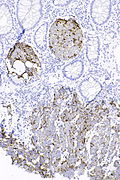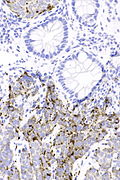Difference between revisions of "Prostatic specific acid phosphatase"
Jump to navigation
Jump to search
(Created page with "'''Prostatic specific acid phosphatase''', abbreviated '''PSAP''', is prostate marker that predated PSA. ==General== *Cannot...") |
|||
| (5 intermediate revisions by the same user not shown) | |||
| Line 1: | Line 1: | ||
'''Prostatic specific acid phosphatase''', abbreviated '''PSAP''', is [[prostate gland|prostate]] marker that predated [[ | '''Prostatic specific acid phosphatase''', abbreviated '''PSAP''', is [[prostate gland|prostate]] marker that predated [[prostate-specific antigen]] (PSA). | ||
It is also known as '''prostatic acid phosphatase''', abbreviated '''PAP'''. | |||
==General== | ==General== | ||
*Cannot differentiate between benign prostate and [[prostate cancer]], like PSA.<ref name=pmid9428385>{{Cite journal | last1 = Sauvageot | first1 = J. | last2 = Epstein | first2 = JI. | title = Immunoreactivity for prostate-specific antigen and prostatic acid phosphatase in adenocarcinoma of the prostate: relation to progression following radical prostatectomy. | journal = Prostate | volume = 34 | issue = 1 | pages = 29-33 | month = Jan | year = 1998 | doi = | PMID = 9428385 }}</ref> | *Cannot differentiate between benign prostate and [[prostate cancer]], like PSA.<ref name=pmid9428385>{{Cite journal | last1 = Sauvageot | first1 = J. | last2 = Epstein | first2 = JI. | title = Immunoreactivity for prostate-specific antigen and prostatic acid phosphatase in adenocarcinoma of the prostate: relation to progression following radical prostatectomy. | journal = Prostate | volume = 34 | issue = 1 | pages = 29-33 | month = Jan | year = 1998 | doi = | PMID = 9428385 }}</ref> | ||
===Positive=== | |||
*Benign prostate. | |||
*[[Prostate cancer]]. | |||
*Some hindgut [[neuroendocrine tumour]]s.<ref name=pmid1712549>{{Cite journal | last1 = Azumi | first1 = N. | last2 = Traweek | first2 = ST. | last3 = Battifora | first3 = H. | title = Prostatic acid phosphatase in carcinoid tumors. Immunohistochemical and immunoblot studies. | journal = Am J Surg Pathol | volume = 15 | issue = 8 | pages = 785-90 | month = Aug | year = 1991 | doi = | PMID = 1712549 }}</ref><ref>{{cite journal |authors=Koo J, Zhou X, Moschiano E, De Peralta-Venturina M, Mertens RB, Dhall D |title=The immunohistochemical expression of islet 1 and PAX8 by rectal neuroendocrine tumors should be taken into account in the differential diagnosis of metastatic neuroendocrine tumors of unknown primary origin |journal=Endocr Pathol |volume=24 |issue=4 |pages=184–90 |date=December 2013 |pmid=24037217 |doi=10.1007/s12022-013-9264-9 |url=}}</ref> | |||
==Microscopic== | ==Microscopic== | ||
| Line 10: | Line 17: | ||
===Images=== | ===Images=== | ||
<gallery> | <gallery> | ||
Image:Prostate carcinoma in rectum - PSAP -- intermed mag.jpg | PSAP - intermed. mag. | |||
Image:Prostate carcinoma in rectum - PSAP -- high mag.jpg | PSAP - high mag. | Image:Prostate carcinoma in rectum - PSAP -- high mag.jpg | PSAP - high mag. | ||
</gallery> | </gallery> | ||
Latest revision as of 20:55, 2 August 2022
Prostatic specific acid phosphatase, abbreviated PSAP, is prostate marker that predated prostate-specific antigen (PSA).
It is also known as prostatic acid phosphatase, abbreviated PAP.
General
- Cannot differentiate between benign prostate and prostate cancer, like PSA.[1]
Positive
- Benign prostate.
- Prostate cancer.
- Some hindgut neuroendocrine tumours.[2][3]
Microscopic
Features:
- Cytoplasmic staining.
Images
References
- ↑ Sauvageot, J.; Epstein, JI. (Jan 1998). "Immunoreactivity for prostate-specific antigen and prostatic acid phosphatase in adenocarcinoma of the prostate: relation to progression following radical prostatectomy.". Prostate 34 (1): 29-33. PMID 9428385.
- ↑ Azumi, N.; Traweek, ST.; Battifora, H. (Aug 1991). "Prostatic acid phosphatase in carcinoid tumors. Immunohistochemical and immunoblot studies.". Am J Surg Pathol 15 (8): 785-90. PMID 1712549.
- ↑ Koo J, Zhou X, Moschiano E, De Peralta-Venturina M, Mertens RB, Dhall D (December 2013). "The immunohistochemical expression of islet 1 and PAX8 by rectal neuroendocrine tumors should be taken into account in the differential diagnosis of metastatic neuroendocrine tumors of unknown primary origin". Endocr Pathol 24 (4): 184–90. doi:10.1007/s12022-013-9264-9. PMID 24037217.

